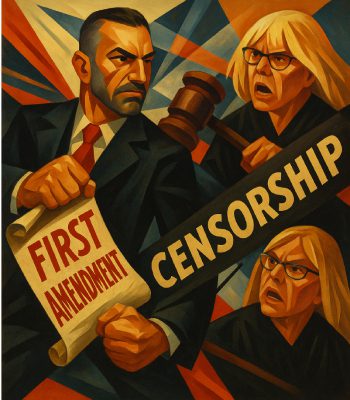
Karen Read Trial First Amendment Cases

Attorney

Attorney
Case Overview
The Karen Read case is, to put it lightly, high profile in Massachusetts. Many believe that she is being framed for a murder. Others find that ridiculous, and think those who believe it are conspiracy theorists. The New York Post has a good primer on the case, here.
We are agnostic about Karen Reed’s guilt or innocence. The First Amendment was under attack by the Government in this case.
We initially leaned toward thinking that the Commonwealth of Massachusetts wouldn’t ever frame a murder suspect, even if that case was taking place in the exact same courthouse where Sacco and Vanzetti were railroaded.
We were very skeptical of claims of prosecutorial misconduct. We were not quite yelling “fry Karen Read,” but we presumed the best of the Commonwealth.
After all, why would they frame someone? The “Free Karen Read” crowd had to convince me, and they had not done so.
Then the Commonwealth went after a journalist – who may be passionate about the case, but did nothing that was not First Amendment protected. (Disclosure, RLG represents that journalist in an unrelated matter, and this post should not be considered to be speaking on his behalf).
Governments that are acting legitimately do not arrest journalists.
Then, the Commonwealth asked that all protest around the courthouse be banned.
Now we know the Commonwealth is dirty. Whether Karen Read is innocent or guilty, the Commonwealth of Massachusetts has disgraced itself.
The Commonwealth of Massachusetts is not just trying the defendant—the First Amendment is on trial, too. With the blessing of the Superior Court, the state imposed a sweeping “buffer zone” around the Dedham courthouse, banning anyone from displaying signs, using sound equipment, or expressing a viewpoint about the trial within 200 feet of the building.
The justification? Convenience. The effect? Censorship.
Representing independent journalists and concerned citizens, we filed federal lawsuits challenging this unconstitutional “prior restraint” in conjunction with the Center for American Liberty. Peaceful speech about the Read trial was banned. Commercial speech, casual banter, and Bruins chants? All permitted. The government carved out an exception for anything except criticism. That’s not a neutral rule—that’s a muzzle.
Police threatened reporters for filming on public sidewalks. One officer ripped a sticker off a man’s jacket because it expressed the “wrong” opinion. Another told a journalist he wasn’t “real media.” These aren’t isolated incidents, but rather the predictable result of an order so vague and overbroad that it hands raw discretion to law enforcement and invites viewpoint discrimination.
The sidewalk in front of a courthouse has always been a place for protest, commentary, and yes — journalism. The First Amendment wasn’t drafted to protect popular speech in polite spaces. It exists because of moments like this, when the government overreaches, and people speak anyway. We’re proud to represent those people. Because when the state tries to shut you up, we speak louder.
VICTORY FOR THE FIRST AMENDMENT
The First Amendment is back from vacation in Massachusetts. After treating courthouse sidewalks like North Korea with better landscaping, the First Circuit reminded everyone that free speech doesn’t take vacations just because some officials or judges might be offended.
In this case, we had signs that mocked a judge, and state police who are clearly on an authoritarian power trip when it comes to anyone who disagrees with their view of the Karen Read case.
After being told by the higher court to do her job consistent with the Constitution, Judge Cannone seems to have gotten the message. Now, she has cut the zone back to the contours that already existed under state law. You can’t intimidate or block trial participants and you can’t disturb the peace. Fair enough. That is all we wanted.
This buffer zone was, in practice, a euphemism for censorship. You don’t get to sanitize public spaces of uncomfortable opinions just because someone in authority might not like what they hear on their way to work. This was never about ‘protecting justice.’ It’s about power being allergic to criticism.
This order is a victory for the First Amendment, which deserves respect no matter who is offended.
CASE DOCUMENTS
PROTESTORS:
JOURNALISTS:
- NEW: Renewed motion for preliminary injunction (in light of First Circuit win)
- Verified Complaint
- Exhibit A - April 4, 2024, Buffer Zone Order Commonwealth v. Read
- Exhibit B - March 17, 2025, Commonwealth’s Motion for Buffer Zone Commonwealth v. Read
- Exhibit C - March 25, 2025, Buffer Zone Order Commonwealth v. Read
- Exhibit D - Michel Bryant Video April 1, 2025
- Exhibit E - Tom Derosier Video April 1, 2025
- Civil Cover Sheet
- Certification of Basis for Related Case
The matter was appealed to the First Circuit Court of Appeals on an emergency basis.
APPEAL DOCUMENTS:
- FIRST CIRCUIT JUDGMENT AND OPINION
- OPENING BRIEF AT FIRST CIRCUIT
- ANSWERING BRIEF AT FIRST CIRCUIT
- REPLY BRIEF AT FIRST CIRCUIT
- Motion for Injunction Pending Appeal
- Opposition to Motion for Injunction Pending Appeal
- Reply Brief in Support of Injunction Pending Appeal
- Amicus Brief of Jane Roe (rejected by Court)
- Amicus Brief from the First Amendment Lawyers’ Association (FALA), the National Press Photographers’ Association (NPPA), and the Foundation for Individual Rights and Education (FIRE)
- Amicus Brief of The Canton 9 (rejected by the Court)
- Emergency Motion to Enforce Order
- Opposition to Motion to Enforce Order
- Reply to Support Enforcement of Order
- Memorandum and Order on Plaintiffs’ Motion for Temporary Restraining Order
Dismissal:
audio of the oral argument:
Press Coverage:
Special thanks to the Center for American Liberty for their support in this case.
